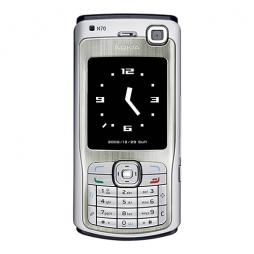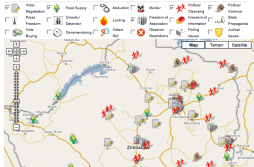zimbabwe
Posted by KatrinVerclas on Mar 05, 2007
Gerry Jackson reports on Media Helping Media about the radio station SW Radio Africa outsisde of London that is sending sms headlines about news in Zimbabwe to it's subscriber base of about 2,000 mobile users. Jackson writes:
"We generate news headlines on a daily basis anyway - so this is just another way of using what already exists.
It’s nice and cost effective for any additional donor because there is only the one cost, actually sending the texts. In two months we’ve built up an address database of about 2,000 mobile phone numbers. Like many, Zimbabweans truly love their mobile phones and of course what we’re banking on is the virus effect.
We also get up to 100 requests a day to be added to the service so it’s growing rapidly. What becomes interesting is what business model to use?
Posted by AnneryanHeatwole on Aug 05, 2011
Today's Mobile Minute brings you news about Apple's profit share, the Atlantic Magazine's case for texting, the launch of free SMS in Zimbabwe, a look at how mobile device users choose video apps, and a report on malware in Android's marketplace.
- PC Mag reports that Apple's iOS, despite being only 20% of the world's smartphone market, receives roughly two-thirds of mobile phone profits. The magazine breaks down the data in several charts, showing operating profits across quarters, and how operating shares have changed between 2007 and now (in Q2 2007, Apple had 1% of the market and the most popular vendor, Nokia, had 55%; by Q2 2011, Apple has 66% of the market).
- Curious about why SMS matters? Check out The Atlantic's "Why Texting is the Most Important Information Service in the World." The article pulls together a lot of statistics and real-world examples to demonstrate how SMS is used around the world. From government initiatives in the Philippines (the article reports "87 percent of Filipinos prefer communicating with the government via SMS, compared to 11 percent with an Internet-preference"), to mobile payments in Afghanistan, to agricultural info and help lines in Uganda, the piece looks at how SMS is changing the way people use their phones to interact with the world around them.
- In other SMS news, the company Free SMS Zimbabwe has launched a new initiative that combines advertising with texting. Users of the service can send an SMS with a maximum of 100 characters and the other 60 will be an advertisement; users can send 100 character SMSs for free as the company subsidizes the cost through the ads.
- When choosing mobile video apps, a Nielsen Wire survey reveals that the most important factor is "free/low subscription rates." Roughly 63% of respondents chose cost as a very important factor when choosing a mobile video application, more than other factors like video selection, presence of advertisements, or the ability to sync multiple devices.
- The 2011 Mobile Threat Report, a new study from Lookout Mobile Security, found some big security threats to Android users. eWeek reports that "Android handset users are 2.5 times more likely to be affected by malware today than they were 6 months ago, as anywhere from 500,000 to 1 million users were impacted by malware on their smartphone or tablet computer."
[Mobile Minute Disclaimer: The Mobile Minute is a quick round-up of interesting stories that have come across our RSS and Twitter feeds to keep you informed of the rapid pace of innovation. Read them and enjoy them, but know that we have not deeply investigated these news items. For more in-depth information about the ever-growing field of mobile tech for social change, check out our blog posts, white papers and research, how-tos, and case studies.]
Image courtesy Flickr user QiFei
Posted by MarkWeingarten on Mar 08, 2011
ICTs and Political Activism - a Zimbabwean Experience data sheet 1665 Views
Abstract:
To counter the Zimbabwean government’s tight grip over the traditional media, activists integrated old fashioned tactics of leaflets, graffiti, and small covert meetings with electronic media: short wave radio, pocket sized video cameras, digital cameras, fax machines, the Internet and email.
An early adopter of this mix of ICTs was Kubatana.net, a locally based non-profit which became an important aggregator of civic and human rights information on Zimbabwe. Its free online archive, established in 2001, offered articles, reports, documents and interviews with much of the information sourced from local civic organisations and international watch dogs. Its electronic NGO directory made civil society organisations accessible at a time when contact details were extremely fluid. Its email newsletter mailing list kept thousands of ordinary Zimbabweans regularly informed of events, opportunities and newly added resources to the web site. And its early adoption of SMS proved crucial to keeping Zimbabweans informed during the critical 2008 elections.
Posted by AnneryanHeatwole on Aug 27, 2009
Freedom Fone data sheet 3661 Views
Organization that developed the Tool:
Problem or Need:
Freedom Fone addresses the need for simple, affordable, uncensored communication technology. It allows for frequently-updated, short segment audio programming. It removes the technical challenge of hosting and setting up the back-end, allowing users to concentrate on content.
Brief Description:
Freedom Fone merges the mobile phone with citizen radio programming. Audio files are stored by Freedom Fone in a content management system which is updated through a simple-to-use browser interface. These audio clips populate an Interactive Voice Response (IVR) menu which callers can navigate through for information. Individuals can contribute questions, content and feedback by leaving voice messages via the IVR interface. Freedom Fone can be operated as a collective, with different groups managing different channels of information from the same installation.
Tool Category:
App resides and runs on a server
Key Features :
The Freedom Fone system lets implementers create simple voice menus that users can call in and navigate using their keypad. The voice menus can contain the news and information that the users may be interested in listening to, and also allow users to leave messages. There is also call-back functionality (user calls, hangs up, the system calls them back) for user cost reduction. The system includes SMS polling functionality as well.
These, and more features, are listed on the feature pages of version 1.5, and version 1.0.
Main Services:
Interactive Voice Response (IVR)
Voting, Data Collection, Surveys, and Polling
Number of Current End Users:
Number of current beneficiaries:
Support Forums:
https://dev.freedomfone.org/wiki
Handsets/devices supported:
Mobigater (http://www.mobigater.bg) GSM modems. See more details at http://dev.freedomfone.org/wiki/
Reviews/Evaluations:
http://news.bbc.co.uk/2/hi/technology/7785847.stm
Is the Tool's Code Available?:
URL for license:
https://dev.freedomfone.org/browser/trunk/license/MPL
Is an API available to interface with your tool?:
Posted by KatrinVerclas on Mar 27, 2008
Zimbabwe is going to the polls on Saturday and candidates there have made extensive use of mobile phones to get their message out. In what is likely going to be a fraught election with poll irregularities and violence feared, the three main candidates are nonetheless using mobiles to engage their supporters and get them to the polls.
Zimbabweans, faced with a state-controlled media with few independent outlets, are also using text message jokes to express their opinions, as we have reported previously here at MobileActive.org. According to the Voice of America, "One of the most popular messages, at the moment, among Mutare residents is one that reads "President Robert Mugabe should be sent to farm, while Morgan Tsvangirai of the opposition movement For Democratic Change should be sent to school... And [former ruling party finance minister] Simba Makoni must be allowed to rule."
The message is believed to the brain child of Makoni's backers."
The joke refers to Mugabi's controversial land reform, and candidate Twvangirai's limited formal education.
Posted by Simon Pavitt on Feb 23, 2008
There's a great article about spread of mobile phones in India and Africa on the BBC News website.
For instance, it mentions how migrant Zimbabwean workers in South Africa send money back using M-banking and avoid having to pay bribes to border guards when they go home.
Posted by CorinneRamey on Nov 17, 2007
MobileActive07 is quickly approaching, and as we get ready, we bring you a series of sneak peaks of some of the interesting people, projects, and technologies that will be at the conference.
Brenda Burrell, who will be joining us from Zimbabwe, is one of founders of Kubatana.net. Brenda sat down with MobileActive for a discussion about her work using mobiles as an alternative media source in Kubatana and Dialup Radio.


